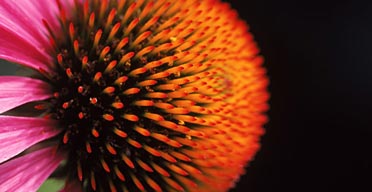
There is no proof that individualised herbal medicines do any good but a significant risk that they may do harm, according to a study published today.
The study's author, Peter Canter, of the Peninsula medical school in Exeter, believes they should be banned. He says herbalists are promoting their individualised remedies - cocktails of up to 20 different herbs mixed for specific customers - on the back of the real evidence on the effect of standardised doses of single herbs such as St John's wort for depression.
He and his colleague, Edzard Ernst, also have concerns about the single herb extracts sold in health food shops and on the shelves of high street chemists such as Boots. Those that work for conditions including heart disease or depression are powerful medicines and could do damage by interacting with conventional drugs. They should only be prescribed by qualified medical practitioners.
"In my view, self-medication for serious conditions is out of the question," said Professor Ernst. "A depressed patient who takes St John's wort and comes out of depression arguably gathers enough strength to commit suicide, so it is dangerous."
But the market in over-the-counter herbal medicines is huge - worth £191m in the last year - and is growing rapidly. "It is being promoted every single weekend in UK newspapers by health writers of, I think, dubious repute," he said.
The Prince of Wales, who has a foundation to support complementary medicine, had also had an impact, he said, and so had the 40m websites selling herbal products.
Dr Canter's review, published in today's Postgraduate Medical Journal, found there was an almost total absence of evidence for any benefit from the tailored herbal cocktails prepared by herbalists, including traditional Chinese medicine and Ayurvedic practitioners.
At least 1,000 herbalists are registered in the UK, but many more are unregistered, said Dr Canter. Anyone can set themselves up as a herbalist.
"They make a mixture of herbs individually tailored for you. Often it is made in the back of the shop or clinic. They claim to have an evidence base, so our study was to look at how much evidence there is."
It found hardly any, he said - even after writing to 15 organisations representing herbalists asking for evidence. Out of 1,300 papers in the scientific literature, only three were properly controlled, randomised trials, and one of those was as yet unpublished. In the treatment of osteoarthritis of the knee and the relief of cancer chemotherapy side-effects, the herbal mixtures did not work at all. In irritable bowel syndrome, they were better than nothing, but the patients who did best were those on a standardised herbal medicine, not on an individualised cocktail.
The UK drug regulator, the Medicines and Healthcare products Regulatory Authority (MHRA), has been looking at herbal medicine, and statutory regulation for herbalists is imminent. Other areas where changes may be made are in manufacturing and import licences.
Dr Canter said he was concerned about possible harm from individualised herbal medicine. "There are risks in the actual materials in the remedies," he said. "Some are inherently toxic herbs."
There had been "numerous cases" of banned toxic herbs such as aristoclia, which causes cancer, turning up in individualised herbal medicines, he said. There have been well-documented cases of Chinese herbal remedies containing prescription drugs or being polluted by agrochemicals. There was also a danger that some herbs in the cocktail could interact with drugs prescribed by a medical doctor.
He had further concerns that herbalists were not always trained to spot the "red flag signs" of serious disease which meant they must refer the patient to a doctor, and that they might not know how to treat the patient if they suffered serious side-effects from the herbal remedy.
Ann Walker, director of the British Herbal Medicines Association, insisted that most herbalists were well-trained and knew when to refer patients. She said herbalists took a three or four-year degree course before accreditation.
She acknowledged the lack of proof of efficacy for individualised herbal medicine. "The evidence is scanty because the studies have only recently been started," she said. This did not mean there was no efficacy.
Kim Lavely, chief executive of the Prince of Wales' Foundation for Integrated Medicine, said it did not promote complementary medicine or comment on individual treatments. "But we would certainly endorse the conclusion that there is not enough evidence around the effectiveness of this or many of the most popular complementary therapies," she said. "We're working very hard to try to build up the evidence base."
What works - and the risks
Kava kava
For anxiety. Banned in Britain because of three deaths and six transplants resulting from liver toxicity
Ginkgo biloba
Leaves of the oldest living tree species - for dementia. Some concern over possible increased risk of brain haemorrhage
Devil's claw
For musculo-skeletal pain, such as backache. May increase stomach acid and should be avoided by people with ulcers
Saw palmetto
For enlarged prostate. Should not be taken with drugs like aspirin or warfarin which increase bleeding, and may interfere with the pill
St John's wort
For depression. Interacts with some conventional drugs, such as immune system suppressants, causing heart transplants to be rejected, and the pill
Valerian
For insomnia. High doses may cause a drug "hangover" effect
Hawthorn
For congestive heart disease. Too serious a condition for self-treatment
Willow bark
For pain relief. Consult doctor if you have asthma or ulcers
Andrographis paniculata
For the common cold. Not available in the UK
Echinacea
North American flower for the common cold. Some people have allergic reactions

